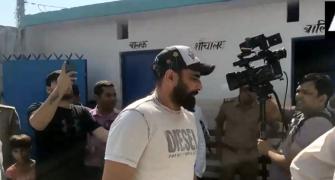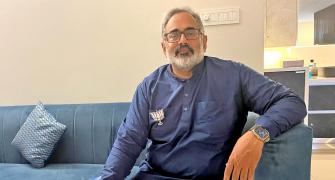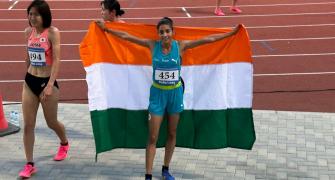

Iftikhar Gilani, a journalist with The Kashmir Times, who was arrested by the Delhi police on a charge of spying for Pakistan and jailed for almost seven months, won his freedom on Monday after the Union home ministry decided to withdraw the case against him.
The matter became something of an embarrassment for the government when no less a personage than the director general of military intelligence testified in court that there was nothing secret in the 'classified military documents' that were found in Gilani's possession.
Gilani, who was a very relieved man when he returned home, spoke to rediff.com about his harrowing experience:
I was at my residence in Malviya Nagar, south Delhi, when a team of police, income-tax and Intelligence Bureau officials raided it. They ransacked the whole house and searched every room. I was made to sit in the drawing room for hours.
It was then that I switched on the television. I was shocked to see how the television networks were relaying the news. Some said I had run away from my residence and was absconding. Other networks referred to my wife as absconding. And there I sat in my house, with my wife and two children, surrounded by policemen!
I was taken to the Lodhi Colony police station in central Delhi. I was there for a couple of days. It was the special cell office. They treated me decently. Intelligence Bureau officials were supposed to come and interrogate me, but they did not turn up. My police remand was extended for some days.
Then I was shifted to Tihar Jail. The moment I reached there and was being admitted as a prisoner, there was an uproar. "He has come! There he is!" scores of voices rose. They were men in plain clothes, some convicts, some jail officials. And they attacked me. I was beaten badly. I was taunted as a terrorist, a traitor. Hatred was the only emotion I encountered.
I spent the days there sleepless on the rough prison floor. It was ward #10, the place where first-timers are kept. The inmates were hostile and aggressive in their attitude towards me. After a few days I was shifted to a block where only convicts awaiting the death sentence are lodged. They call it "high risk".
I was kept there in solitary confinement for some days. Then, during a meeting with a jail officer, I pointed out that I
was not supposed to be in that section. He knew about it, but feigning ignorance ordered his subordinates to shift me to the place I was in earlier.
The Hindi newspapers the prisoners could lay their hands on had painted me as a villian. It added to the animosity towards me. In those bleak times, the two visits every week from my wife would be the only ray of hope. She gave me courage.
When I was arrested, I told her to return to Kashmir with the kids as I was not sure when I would be coming back. But she stayed put. With monetary support from my organisation, The Kashmir Times, which stood behind me and despite my incarceration sent my salary, she kept sending the children to school and fighting for my release.
Outside the prison doors, my journalist friends had lent their support and worked for my release. I learnt much later that detailed reports were carried by The Indian Express proving that the evidence against me was no evidence at all. I was overwhelmed by their faith in my innocence.
But before I learned of all that, inside the mediaeval, uncivilized jail environs, I was losing hope. The day began early, with a badly made cup of tea. It used to take some effort to eat the inedible jail food. A fellow prisoner referred to a superstition. "You are destined to eat a fixed quantity of food in jail. Eat it fast and you will be out fast," he said. I felt like believing it, even his superstitious though sympathetic words.
Anyhow, I ate that food and awaited my release. Every day passed with the hope of this elusive dawn. And I spent my days doing manual labour in the ward I was lodged in. I had to clean the toilets, serve food, wash clothes like other prisoners. Every inmate took turns, so did I. The hostility, the taunts and the rude behaviour of the jail staff, despite the much touted reforms carried out by Kiran Bedi, continued.
Some relief came in August. I was shifted to another dormitory, known as the IGNOU ward. The educated prisoners were lodged here. Corporate criminals arrested for frauds to the tune of hundreds of crores of rupees were there. It was better there, as these rich men had manged to get in things of daily use.
We still slept on the rough floor. It had become part of the routine. The back did not hurt anymore. The flesh was no longer sore. One day when I was ill, I was taken to a hospital. It had a bed, mattress, cushion. I had forgotten about all those things that exist in our daily life. I actually could not get any sleep on that comfortable bed that night.
In the IGNOU ward, we had a library, which had some obselete books donated by someone. There were a few computers, which never worked. And there was television. The jails authorities had impressed a visiting delegation of Afghan policemen by showing them the portion of the jail with the library and computers.
I told a jail officer, "Don't give them high hopes. If they tell their countrymen these stories, they will run to India, sell drugs and hope to be lodged in this jail."
Ansia, my wife, kept visiting me twice a week. In that brief meeting with her in a part of the jail, I got news of the world outside, my chances in the case, who was saying what. And then news of my kids.
But I was losing hope. This Friday, I was listening to news on BBC Radio in the jail. I was quite depressed. Then, suddenly, the newsreader said the Government of India had decided to withdraw the charges against me. I was overhwelmed. My innocence had been proved, my dignity had been restored.
Then I came to know that the charges would be withdrawn in court on Monday. And I was released. I was happy to return from the jail to the civilized world .But I felt about the state of affairs, the living conditions of the inmates inside the jail.
At the court, some enthusiastic reporters repeatedly asked me whether I want to sue the government for framing me. It seemed yet another sensationalist report, like the ones that had dubbed me an anti-national, as someone who had links
with the Pakistani Inter-Services Intelligence.
I do not want to sue anyone. It was a section of the establishment, to be precise, a part of the Intelligence Bureau, which framed me. The system needs overhauling, the archaic and arbitrary Official Secrets Act under which I was booked needs to be changed.
But it was a part of the establishment only which bailed me out by withdrawing the case against me. And Defence Minister George Fernandes called me this morning and said my arrest had sparked a debate on the OSA within the establishment.
I do not want to sue anyone. My freedom is my greatest compensation.
As soon as this interview was over, Iftikhar Gilani left for Parliament House to get his press pass reissued. The freed reporter is back at work.








